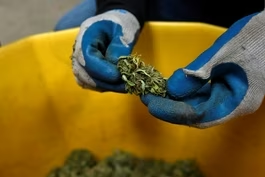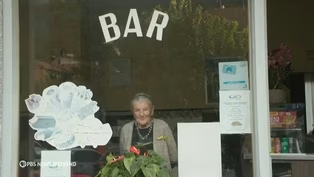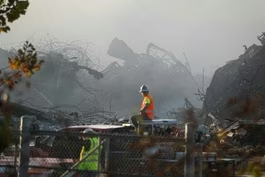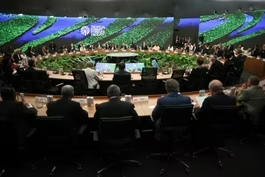
November 16, 2025 - PBS News Weekend full episode
11/16/2025 | 26m 31sVideo has Closed Captions
November 16, 2025 - PBS News Weekend full episode
November 16, 2025 - PBS News Weekend full episode
Problems playing video? | Closed Captioning Feedback
Problems playing video? | Closed Captioning Feedback
Major corporate funding for the PBS News Hour is provided by BDO, BNSF, Consumer Cellular, American Cruise Lines, and Raymond James. Funding for the PBS NewsHour Weekend is provided by...

November 16, 2025 - PBS News Weekend full episode
11/16/2025 | 26m 31sVideo has Closed Captions
November 16, 2025 - PBS News Weekend full episode
Problems playing video? | Closed Captioning Feedback
How to Watch PBS News Hour
PBS News Hour is available to stream on pbs.org and the free PBS App, available on iPhone, Apple TV, Android TV, Android smartphones, Amazon Fire TV, Amazon Fire Tablet, Roku, Samsung Smart TV, and Vizio.
Providing Support for PBS.org
Learn Moreabout PBS online sponsorshipJOHN YANG: Tonight on PBS News Weekend in Charlotte, North Carolina, a second day of arrest by a surge of Border Patrol agents in Operation Charlotte's Web.
Then, the provision in the bill that entered the government shutdown that may threaten the U.S.
hemp industry's future.
And a barista who served coffee in a small northern Italian town since World War II and is still going strong.
WOMAN (through translator): I have customers who are now grandparents and come in with their grandchildren saying, do you remember when there was a dance floor outside, when there was a jukebox and pinball machines?
Those were different times.
Now they're only memories.
(BREAK) JOHN YANG: Good evening.
I'm John Yang.
It's been the second day of Operation Charlotte's Web.
That's what the Department of Homeland Security is calling the surge of federal officers into Charlotte, North Carolina, to crack down on illegal immigration.
Masked agents have made arrests outside businesses and on front yards of homes.
One Honduran born U.S.
citizen was stopped twice yesterday.
They smashed his car window, forced him out of the vehicle and threw him to the ground.
He was released only after he showed proof of his citizenship.
In a Charlotte enclave of immigrant residents, hundreds protested the administration's expansion of raids into another city and state, both led by Democrats.
Border Patrol Commander Gregory Bovino said Saturday was a record day with 81 arrests.
Residents are bracing for more.
CARLOS MAGANA, North Carolina Resident: The impact it's having on us is that a lot of people are afraid to go outside.
It's terrifying to pretty much know that at any moment a federal agent can just come out and abuse you just because of the way you look.
JOHN YANG: Meanwhile, the Pentagon is sending home hundreds of National Guard troops that President Trump had deployed to Portland and Chicago.
In Southern California, the forecast is for Maureen today, but storms eased overnight, allowing officials to lift mandatory evacuation orders.
Residents woke up to fallen trees and rising waters.
The risk of mudslides persists, and officials urge people to drive slowly and be aware of debris.
At least two deaths have been reported, and one child is still missing.
The U.S.
Navy's most advanced aircraft carrier, the USS Gerald R. Ford, arrived in the Caribbean today, marking the largest buildup of U.S.
firepower in the region in generations.
It comes just days after President Trump said he had sort of made up his mind about what he'll do in Venezuela.
That raises questions about what's next in the region.
Mr.
Trump and Venezuelan President Nicolas Maduro are engaged in a war of words, and since September, the U.S.
military has struck 21 boats international waters as part of antidrug campaign.
At least 80 people have been killed.
The Ukrainian president, Volodymyr Zelenskyy, says 1,200 Ukrainian prisoners could soon be returning home.
He says talks with Russia to resume prisoner exchanges are progressing Overnight, Russian drones damaged Ukraine's energy infrastructure in Odesa, while Ukraine struck a major oil refinery in Russia's Samara region.
In an Associated Press interview, Finnish President Alexander Stubb said he didn't expect a ceasefire anytime soon and urged Europe to maintain its support for Ukraine.
ALEXANDER STUBB, Finnish President: I'm not very optimistic about achieving a ceasefire or the beginning of peace negotiations, at least this year.
I mean, perhaps if we get something going by February, March, that would be good.
JOHN YANG: Stubb also said President Trump and European leaders need to step up pressure on Russia to achieve peace.
Chilean voters went to the polls today and the nation's polarized presidential election.
They chose between four leading candidates who've been competing over who's the toughest on crime and immigration.
Preelection polls suggested there would be a December runoff, as none of them appeared likely to get the simple majority needed to win.
The wild card is a surge of new voters.
A new law makes voting mandatory, and eligible Chileans who don't vote are subject to fines of up to $100.
This weekend is the halfway point for the 30th annual U.N.
Climate Summit, known as COP30.
Delegates from nearly 200 countries are meeting in Belem, Brazil, on the edge of the Amazon rainforest, which is the world's largest.
In a report issued just days before the meeting began, the UN's World Meteorological Organization said 2025 is on track to be among the three warmest years on record.
It said the planet's average temperature in the first eight months of the year was nearing the limit for warming set 10 years ago in the landmark Paris Climate Accords.
New York Times international climate reporter Somini Sengupta has just returned from COP 30.
Somini, one former U.N.
climate chief, was quoted as saying that asking what agreement is going to come out of this meeting is the wrong question.
So what is the goal?
What are they trying to do at this time?
SOMINI SENGUPTA, The New York Times: I think primarily they're trying to keep the idea of international climate cooperation alive.
But also the delegates who are meeting in Belem have a couple of things that they want to get done.
They want to see to what extent are countries keeping the commitments that they've made.
And they want to address one of the main demands from the global south, from developing countries, which is financial assistance in transitioning their economies to renewables and financial assistance to adapt to the damages of climate change.
So money is one of the big goals here.
Let's see how that goes.
JOHN YANG: You talk about international cooperation.
There's no senior U.S.
official down there.
You've got a president who is once again withdrawing from the Paris Accords, who talks about fossil fuels and says that climate change is a con job.
What effect is that having on what's going on down there?
SOMINI SENGUPTA: I think it is significant that the United States has not sent senior officials to participate in the actual negotiations, but what is far more significant is what the United States is actually doing in the world.
Not only has the Trump administration for the second time pulled out of the Paris Accords, what you're seeing in the second Trump administration is really a doubling down on fossil fuel expansion.
And as you've noticed, the Trump administration has really used oil and gas exports, U.S.
oil and gas exports, as you know, a diplomatic and trade cudgel.
JOHN YANG: There is a U.S.
delegation there Part of it is Governor Gavin Newsom of California.
What role are they playing?
SOMINI SENGUPTA: Well, Gavin Newsom came to COP on the second day of the negotiations.
He, of course, is not part of the official negotiations, but he was there to have bilaterals with a number of other states and other countries.
I think he was trying to send a message that he can be the reliable partner for the world, especially with California being such a large economy.
But to be honest, over the last couple of decades, the U.S.
really hasn't been a reliable partner on climate diplomacy.
It has gone back and forth long before the Trump administration.
So to some extent, the fact that the U.S.
as a national government is not participating could simply just let the other countries get on with business.
JOHN YANG: One group that is participating, or at least is there in large numbers, are indigenous people.
What role are they playing?
SOMINI SENGUPTA: Yeah, it's very, very notable.
The large, robust presence of indigenous people, not only from Brazil, but from all over Latin America.
They're there to make the case that you cannot talk about the protection of nature, the protection of forests, without having them at the table.
Technically, they are, of course, not at the table.
It's nation states negotiating with each other.
But they have been on panel discussions, they have given, you know, lots of talks.
They have been in protests both inside and outside.
So it is extremely meaningful to the indigenous people I spoke to for them to really have a strong and robust presence and try to shape the conversation.
JOHN YANG: It appears that the limit for warming that was set in Paris is going to be exceeded.
What's the significance of that?
SOMINI SENGUPTA: When the Paris Agreement was signed 10 years ago, the arc of average global temperature rise was something like close to 4 degrees Celsius by the end of this decade, that arc of warming has curved downwards.
We are somewhere around 2.7 degrees Celsius.
In other words, between now, between the start of the industrial era and the end of this century, the global average temperature is projected to go up by around 2.7 degrees Celsius.
That's not great.
That raises all the more the absolute imperative to reduce emissions as quickly as possible.
JOHN YANG: Somini Sengupta, the New York Times, thank you very much.
SOMINI SENGUPTA: Thank you for having me.
JOHN YANG: Still to come on PBS News Weekend, a Georgia town with lingering questions more than a year after a toxic chemical fire.
And Italy's oldest barista turns 101.
JOHN YANG: The legislation Congress passed this past week to reopen the government included a provision banning intoxicating products made out of hemp plant.
Hemp is a type of cannabis, just like marijuana, but has a lower level of the psychoactive element THC.
Because of that, hemp hasn't been as strictly regulated as marijuana.
Critics say that allows the manufacture of synthetic THC products that can be more intoxicating than marijuana.
But others warn that the new limits could kill a growing industry and hurt us hemp farmers.
Ali Rogin spoke with Manisha Krishnan, senior culture editor at Wired.
ALI ROGIN: Thank you so much for joining us.
So just to set the record, on some terms we're going to be using, there's hemp and then there's what people call marijuana or weed.
They're both derivations of the same cannabis sativa plant, but they are regulated differently.
Why is that?
MANISHA KRISHNAN, Senior Culture Editor, WIRED: So cannabis or weed essentially is federally illegal, and it contains Delta 9, which is the psychoactive ingredient that gets people high.
Hemp, on the other hand, comes from the same plant, but it contains very low levels of Delta 9, and it was legalized under the 2018 farm bill.
However, hemp does contain other psychoactive ingredients, including Delta 8, including THCA.
And so what happened when the farm bill was passed was it created this market where for Delta 8 products, for psychoactive products that were derived from hemp.
ALI ROGIN: And so how does that difference in regulation lead to what critics have called a dangerous loophole?
MANISHA KRISHNAN: So essentially what happened with the loophole was it created this market for all of these hemp derived psychoactive products.
And these products are not regulated by the FDA.
So something like Delta 8 gummies or drinks, they're not regulated.
And in that sense, we don't necessarily know what's being put into them.
There could be extra chemicals and things of that nature that are put into them.
And I think that's why some people are arguing that we should have better regulation.
We don't necessarily know what's being in them.
They're not all tested with rigor.
And some of the adverse reports that have come about have been in relation to like, dizziness, nausea.
There haven't really been a lot of deaths, as far as I know, that have been linked to Delta 8 products.
ALI ROGIN: Tell us about the industry, though, that has really blossomed since this legalization was included in this 2018 farm bill.
It seems like the hemp industry really has taken off in this country.
MANISHA KRISHNAN: Yeah.
So, I mean, in 2023, there were about $2.7 billion in sales from these hemp derived psychoactive products.
And then there's also the CBD market.
CBD is not psychoactive, but it is quite popular.
People use it for things like insomnia and anxiety.
And it's also given sort of a new crop to farmers.
So Kentucky, for example, is a big hemp producer.
And so I think there's a lot of sort of different industries that have grown because of the farm bill.
And these products tend to thrive the most in states that do not have legal cannabis.
So now that this ban is going into place, do you think we're going to see a similar dynamic happen with the hemp industry that we've seen with cannabis, where states have been softening their laws?
So you really have a different patchwork of regulations around these products.
MANISHA KRISHNAN: There are already a lot of states that have their own regulations around hemp, just like there are a lot of states that have legal cannabis.
But I think what's interesting is that the majority of Americans do support legal cannabis.
And I feel like right now the hemp industry is sort of looking at this not just as a ban, but potentially as an opportunity to table legislation that would properly regulate these psychoactive hemp products at a federal level.
ALI ROGIN: Some opponents of this legislation were saying, you know, the better way to deal with this is just to weed out the bad actors to put in more enforcement, not necessarily ban it.
MANISHA KRISHNAN: I think that there's an argument to be made that, you know, why can't the FDA simply go in and regulate the hemp industry and the hemp products that already exist?
I think maybe it's a little bit harder because it was tucked into this farm bill and it became this loophole that a lot of people didn't anticipate.
It sort of created this cottage industry that people didn't anticipate.
So I think now potentially with, you know, enough lobbying, there's an opportunity to sort of go back and fix that.
ALI ROGIN: And what's going to happen to the THC products derived from hemp that are currently on shelves available in breweries around the country, that kind of thing?
MANISHA KRISHNAN: I think it'll sort of depend, like it will depend on what the state laws are.
If a state already has regulations around hemp, then in that state, there may still continue to be sales.
However, it will make it a lot harder to do business with other states, to sort of cross state lines.
Banking is another potential huge issue when something becomes federally illegal like this.
ALI ROGIN: Manisha Krishnan with Wired.
Thank you so much.
MANISHA KRISHNAN: Thank you.
JOHN YANG: On a September morning last year, a chemical fire at a Conyers, Georgia facility operated by Biolab to make chlorine products for swimming pools and hot tubs sent a toxic cloud over the area.
A Georgia public broadcasting podcast called Manufacturing Danger, the BioLab Story examined that day, what led up to it and the immediate aftermath.
JEAN SADLER: That Sunday, 7:00 in the morning, they're banging on our door.
You got to evacuate.
What?
You got to get out.
It is a fire.
So we're thinking, oh, okay, they'll have it under control by 5 o'clock.
So we go to the church, and we sat at the church for all those hours.
So finally we realized we can't go home.
JOHN YANG: Now a second season of the podcast hears from whistleblowers and looks at the health consequences residents are experiencing a year later and what could have been done to prevent it.
Georgia Public Broadcasting's Pamela Kirkland reported and hosts both seasons of the podcast.
Pam, walk us through what happened that morning in Conyers.
PAMELA KIRKLAND, Host, Georgia Public Broadcasting: So September 29, 2024, two BioLab employees call 911 because they realize there's a chemical reaction happening in the building that turn into a fire.
And later that day, that fire produces a toxic chemical plume that spreads over Conyers and the surrounding area.
For those of you who don't know, Conyers is a suburb of Atlanta.
So it's about 30 minutes away.
And people were complaining about a haze and a smell of chlorine for days afterwards.
The fire and the plume triggered evacuations, shelter in place orders.
And you heard from Jean Sadler earlier.
She's one of those who was forced to evacuate.
She lived in Conyers for about 50 years and says that she suffered health issues as a result of the fire.
JOHN YANG: You followed some of those residents you just talked about.
What are some of their stories?
PAMELA KIRKLAND: Sure.
So, Sheryl Garcia is another person that I've been in touch with for about a year.
She's a retired nurse practitioner and actually knows a lot about chemicals on her own.
But she talked about how she used to have asthma.
It's been under control for about a decade.
But in the days and weeks after the fire, those asthma symptoms came back and it got so bad that her voice, she called it her BioLab voice because it was so raspy.
She went to speech therapy for it after an ENT examined her and said that while they couldn't attribute what she was suffering from to the fire, they could say that there was some damage to her vocal cord.
So she's been on different medications since and in therapy trying to improve that.
And you know, residents have talked about a number of different symptoms, but you hear patterns.
A lot of people complained about migraines, shortness of breath, irritation, things like that, things that would be symptomatic of chlorine exposure.
JOHN YANG: In one of the episodes of the podcast, you play a 911 tape from the day of the fire.
We hear someone on the tape say it's always BioLab.
What did you learn about the history of that facility and previous incidents of that facility?
PAMELA KIRKLAND: Looking into BioLab's record, we found fires in 2004.
We found another fire in 2015 that prompted some voluntary evacuations, one in 2016 where several firefighters were injured, and another one in 2020 that produced a chemical plume.
Now, the most recent fire, 2024, the company's come under a lot of scrutiny because of.
And there have been a lot of questions as to how this could happen so many times because the details between them have been so similar.
It's always a chemical that's supposed to stay dry gets wet.
A chemical reaction occurs, and it sparks a fire or a large plume of chemical smoke.
So OSHA and the EPA have oversight over companies like this, companies that store large quantities of chemicals.
But what we found is that there's a regulatory gap.
So the chemical that BioLab stores is not under the same kind of oversight that a chemical like chlorine would be, or other more serious chemicals that we're a little more familiar with.
We're talking about something called TCCA, which is involved in making products that clean pools and spas.
So it's a little bit more obscure than, you know, your everyday chlorine.
JOHN YANG: Are there lessons here for other communities that may have these facilities in them?
PAMELA KIRKLAND: So I think the biggest takeaway, residents would say, is that there should be a plan in place.
There were a lot of questions on the local level about how county officials responded to this, how the city of Conyers responded to this BioLab fire.
As there were 19,000 evacuations, 70,000 people were told to shelter in place.
But that day, it was so hard to get out and to get to safety that you were almost stuck.
You were underneath the plume, even though you didn't want to be.
What we've also seen is this network of communities that have come together.
East Palestine, Ohio, the train derailment that happened there in 2023, there were actually residents from there that came to Conyers just to show solidarity and say, hey, we've been through a chemical disaster.
If you have any questions, you can ask us.
If on the federal level, local level, state level, we feel like we're not getting the help and support that we need, at least we can build this network for each other.
JOHN YANG: One of the agencies that investigated this was the U.S.
Chemical Safety Board.
The administration wants to zero that out.
They want to eliminate that.
What effect would that have on towns like Conyers and other places that may have similar facilities?
PAMELA KIRKLAND: So a lot of the details about what happened that day on September 29, 2024, came from the U.S.
Chemical Safety Board's investigations.
They've produced two updates thus far, but we don't have the final investigation quite.
We still don't have a cause of the fire, actually.
And so agencies like the EPA and OSHA take what the CSB does very seriously because they are kind of that independent watchdog.
They can make recommendations.
They can't actually force a company to change how they store chemicals, for example, but they can make suggestions.
They've been suggesting that regulatory gap that we talked about a little bit earlier be closed for decades.
Without the CSB, you don't really have another agency that investigates chemical accidents like this.
Their job is to be a watchdog over the OSHA and EPA.
And yet in the budget request for fiscal year 2026, it says that OSHA and EPA can do the job that the CSB is doing.
So I think we really wouldn't know a lot about what happened here in this case, in the case of East Palestine, Ohio, and other chemical disasters that we've seen over the years if the CSB is no longer investigating.
JOHN YANG: Pamela Kirkland of Georgia Public Broadcasting, thank you very much.
PAMELA KIRKLAND: Thank you for having me.
JOHN YANG: Finally tonight, Italy's oldest barista.
JOHN YANG (voice-over): From 7 in the morning until 7 in the evening, Anna Possi does what she's been doing for more than 80 years, brewing espressos and serving coffees.
ANNA POSSI, Owner, Bar Centrale (through translator): I have customers who are now grandparents and come in with their grandchildren saying, Anna, do you remember when there was a dance floor outside, when there was a jukebox and pinball machines?
Those were different times.
Now they're only memories.
JOHN YANG (voice-over): She first did this sort of job at the end of World War II, when she went to work in her uncle's restaurants.
In 1958, Possi and her husband opened Bar Centrale in the small town of Nebiuno on the shores of Lake Maggiore in northern Italy.
Since her husband died in 1974, she's been on her own.
ANNA POSSI (through translator): It's a bit like a family here, you know.
It doesn't feel like a bar to me.
It feels like a meeting place.
People come in, some come to run an errand, others come and ask me.
Do me a favor.
Could you get your daughter who works in the town hall to bring me my identity card?
Sure.
I'll come and get it tomorrow.
Then there's the other one who says, please, if you see the doctor, get me a referral.
I'll leave you the prescription.
All right.
I'm always available for everyone.
JOHN YANG (voice-over): Possi plans to remain available.
She has no intention of retiring.
She's among the growing number of Italians who are centenarians, the vast majority of them women.
Today is Possi's 101st birthday.
JOHN YANG: And that is PBS News Weekend for this Sunday.
I'm John Yang.
For all of my colleagues, thanks for joining us.
Have a good week.
How new legislation may threaten the hemp industry’s future
Video has Closed Captions
Clip: 11/16/2025 | 5m 27s | How the bill that ended the shutdown could threaten the U.S. hemp industry’s future (5m 27s)
Italy’s oldest barista, who has served coffee since WWII, turns 101
Video has Closed Captions
Clip: 11/16/2025 | 1m 52s | Italy’s oldest barista, who has served coffee since WWII, turns 101 (1m 52s)
News Wrap: Border Patrol makes more arrests in Charlotte
Video has Closed Captions
Clip: 11/16/2025 | 3m 25s | News Wrap: Border Patrol agents make more arrests on 2nd day of Charlotte surge (3m 25s)
Questions linger a year after BioLab’s toxic fire in Georgia
Video has Closed Captions
Clip: 11/16/2025 | 6m 56s | Questions linger in a Georgia town more than a year after the toxic BioLab fire (6m 56s)
Takeaways from COP30 halfway through the UN climate summit
Video has Closed Captions
Clip: 11/16/2025 | 5m 45s | Key takeaways from COP30 halfway through the UN climate summit (5m 45s)
Providing Support for PBS.org
Learn Moreabout PBS online sponsorship
- News and Public Affairs

FRONTLINE is investigative journalism that questions, explains and changes our world.

- News and Public Affairs

Amanpour and Company features conversations with leaders and decision makers.












Support for PBS provided by:
Major corporate funding for the PBS News Hour is provided by BDO, BNSF, Consumer Cellular, American Cruise Lines, and Raymond James. Funding for the PBS NewsHour Weekend is provided by...





